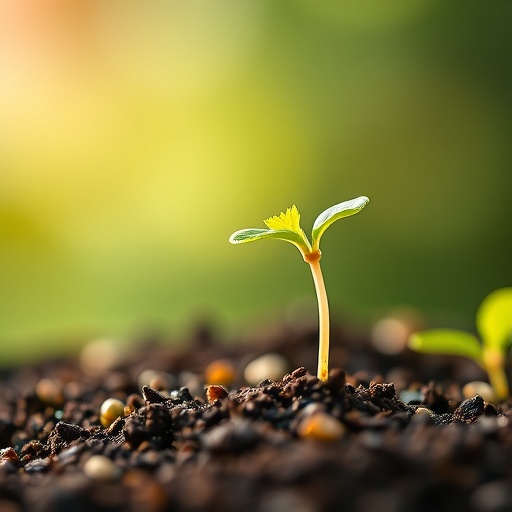In a world struggling to meet the growing demand for food, innovative solutions for agriculture are crucial. A recent review by Adeboye et al. has shed light on an often-overlooked aspect of agriculture: the role of microbial communities in enhancing seed germination. This comprehensive study underscores the potential of harnessing these microscopic allies to improve plant success rates, with significant implications for crop yields and sustainability.
Microbial communities, composed of bacteria, fungi, and other microorganisms, play an integral role in soil health and plant development. These tiny organisms can form symbiotic relationships with plants, aiding in nutrient absorption, disease resistance, and overall plant vigor. The review reveals how these partnerships can be strategically utilized to facilitate seed germination, ultimately leading to more robust plant growth and resilience against environmental stressors.
Seed germination is a critical phase in the plant life cycle, influencing agricultural productivity and ecological balance. The authors emphasize that understanding the interactions between microbial communities and seeds can give farmers a powerful tool to enhance germination rates. By fostering beneficial microbial associations, agronomists could reduce reliance on chemical fertilizers and pesticides, promoting a more sustainable approach to agriculture that benefits the planet.
The review highlights several case studies where microbial inoculants have successfully improved seed germination. For instance, certain bacteria have been shown to produce phytohormones that stimulate seed growth, while specific fungi can enhance nutrient uptake. These findings suggest that integrating microbial solutions into seed treatment protocols could revolutionize how seeds are planted and cultivated, leading to healthier crops with fewer inputs.
One of the exciting opportunities presented in the review is the prospect of developing tailored microbial inoculants. By isolating specific strains of microorganisms that have proven benefits for particular crops, researchers can create targeted solutions that maximize germination and growth potential. This bespoke approach contrasts sharply with the one-size-fits-all solutions often found in commercial fertilizers and pesticides.
However, the authors are careful to address the challenges that come with harnessing microbial communities. One major hurdle is the variability of microbial populations in natural soils. Factors such as soil type, climate, and land management practices can substantially impact which microorganisms thrive. Consequently, identifying the right microbial partners for specific crops in diverse environments is a crucial step that requires further research and development.
Another significant concern is the risk of introducing non-native microbial species into local ecosystems. While the potential benefits of these introductions are considerable, the ecological consequences could be severe. The review advocates for rigorous testing and assessment protocols to ensure that any microbial inoculants used are not only effective but also safe for the environment.
The economic implications of utilizing microbial communities to enhance seed germination are also noteworthy. By increasing seedling success rates and reducing the need for chemical fertilizers, farmers could realize substantial cost savings. This approach not only boosts productivity but also aligns with a growing consumer demand for sustainably produced foods, creating a win-win scenario for both farmers and the environment.
Collaboration between researchers, farmers, and policymakers is essential to facilitate the widespread adoption of microbial solutions in agriculture. The review suggests that creating platforms for sharing knowledge, resources, and best practices can help bridge the gap between scientific research and on-the-ground agricultural application. This collaborative ethos can catalyze the transition toward more sustainable farming practices that prioritize ecological health.
Moreover, public perception and acceptance of microbial solutions are vital components for their successful integration into agricultural systems. Education and outreach campaigns can play a crucial role in informing farmers and consumers about the benefits of using beneficial microbes in farming. By highlighting success stories and research-backed evidence, the agriculture community can build trust in these innovative methods.
The authors conclude by emphasizing the pressing need for further research to unlock the full potential of microbial communities in agriculture. This includes conducting large-scale field trials, exploring the molecular mechanisms behind microbial-plant interactions, and refining methods for microbial inoculation. As the world grapples with the challenges of feeding an ever-growing population amid climate change, leveraging natural processes such as microbial assistance represents a promising avenue for sustainable agriculture.
In summary, Adeboye et al.’s review serves as a clarion call to the agricultural community. It highlights the untapped potential of microbial communities to enhance seed germination and offers a roadmap for future research and application. As we stand at the intersection of technology and nature, the insights provided in this study might just pave the way for a new era of farming—one that prioritizes both productivity and ecological stewardship.
The integration of microbial communities into agricultural practices could very well transform how we approach food production. By capitalizing on the natural relationships between plants and their microbial allies, we can create a more resilient and sustainable future for agriculture, ensuring that we meet the challenges of tomorrow while safeguarding the health of our planet.
Subject of Research:
Harnessing microbial communities to enhance seed germination
Article Title:
Harnessing microbial communities to enhance seed germination: a review of opportunities and challenges
Article References:
Adeboye, K.A., Fayose, C.A., Ayangbenro, A.S. et al. Harnessing microbial communities to enhance seed germination: a review of opportunities and challenges.
Discov Agric 3, 258 (2025). https://doi.org/10.1007/s44279-025-00437-8
Image Credits: AI Generated
DOI: https://doi.org/10.1007/s44279-025-00437-8
Keywords: Microbial communities, seed germination, sustainable agriculture, microbial inoculants, ecological health.
Tags: benefits of microbial inoculants for plantsecological balance in agricultureenhancing seed germination with microbesimproving crop yields through microbiologyinnovative solutions for food productionmicrobial communities in agricultureplant resilience against environmental stressorsreducing chemical fertilizers with microbesrole of soil microorganisms in farmingseed germination and microbial interactionssustainable agriculture practicessymbiotic relationships in plant growth





